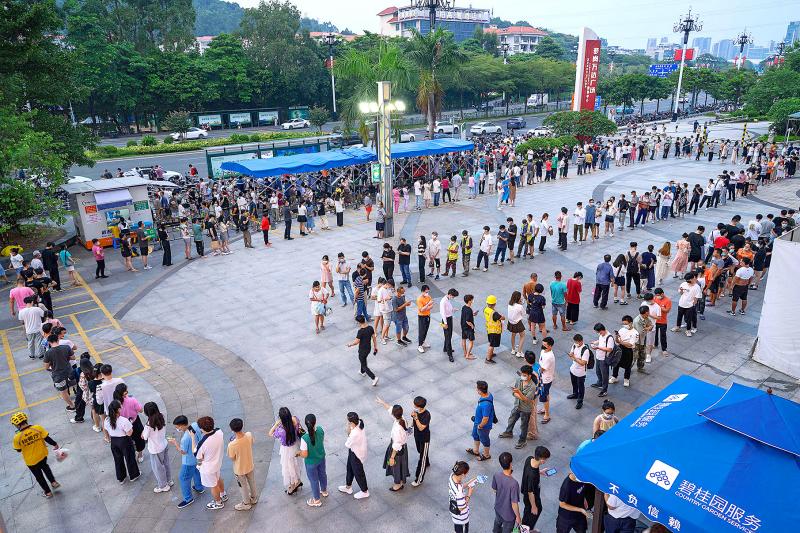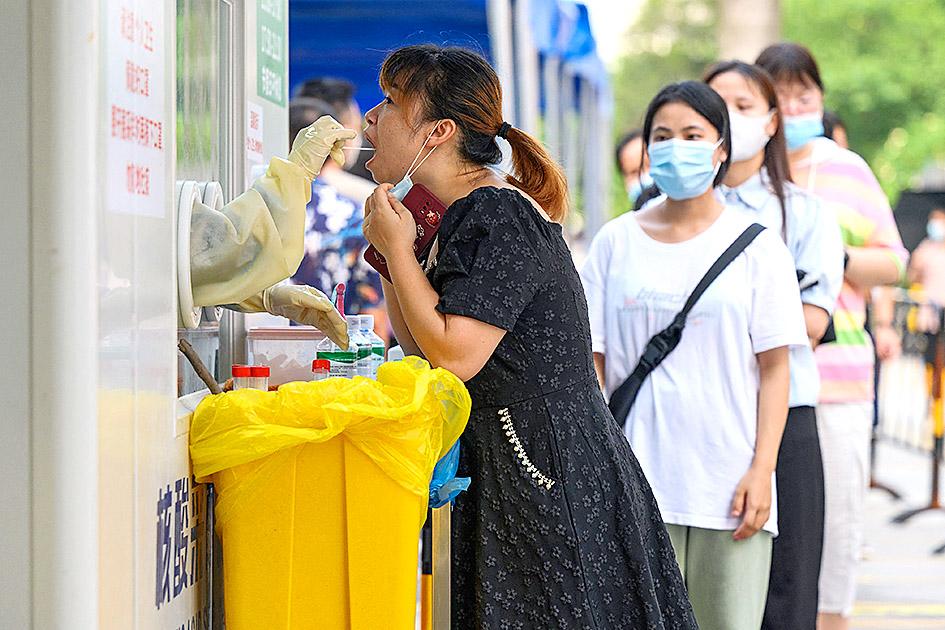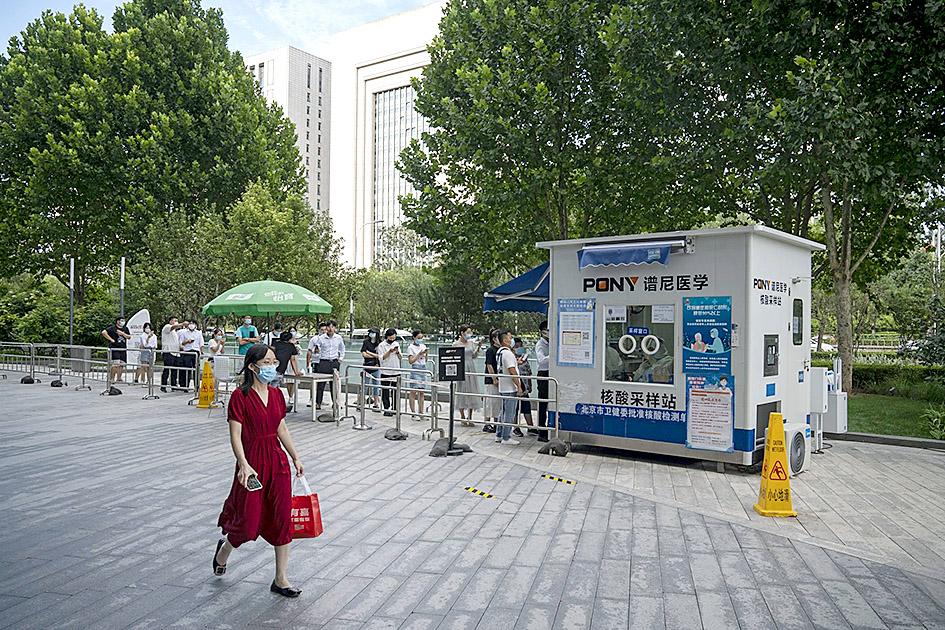When Zuo tested positive for COVID-19 while working as a cleaner in one of Shanghai’s largest quarantine centers, she hoped it wouldn’t be long before she could pick up the mop and start earning again.
But four months on, she is still fighting to get her job back — one of scores of recovering COVID patients facing what labor rights activists and health experts say is a widespread form of discrimination in zero-COVID China. Using snap lockdowns and mass testing, China is the last major economy still pursuing the goal of stamping out the virus completely.
Those who test positive, as well as their contacts, are all sent to central quarantine facilities, while a flare-up in a factory can grind production to a halt.

Photo: AFP
Rights groups say the strict rules are feeding COVID-related discrimination and shutting out thousands of people from China’s already bleak job market — with migrant workers and young people hit hardest.
“People are afraid they might contract the virus from us, so they shun us,” said Zuo, who only gave her last name for fear of retribution.“Recruiters check COVID testing history going back several months during an interview.”
China’s strict control measures have led to stigma against not just recovered patients, but also their families, neighbors, friends and even frontline healthcare workers, said Jin Dongyan (金冬雁) from the School of Biomedical Sciences at Hong Kong University.

Photo: AFP
“It is unscientific to think that people who were infected once will continue to carry the virus and be infectious long after recovering,” Jin said. “Due to the lack of awareness, some fear that those who have been infected are more susceptible to being reinfected, but in reality, it’s the opposite.”
Zuo is now fighting a court battle with her employer, who has refused to pay her wages since she got sick, and who cites her disease history as a reason to bar her from returning to work. Her employer, a service company named Shanghai Yuanmao BPO, declined to comment citing the pending court case.
‘TREATED LIKE A VIRUS’

Photo: Bloomberg
He Yuxiu is a Chinese social media influencer who goes by a pseudonym and was living in Ukraine until Russia invaded.
She fled the war and returned home, then found a job as a Russian-language teacher in northern China’s Hebei province, relieved to have left her troubles behind.
But when her school learned that she had been infected while in Ukraine, she was fired.
“I never imagined I’d lose my first job for this reason,” she said in a video posted on China’s Twitter-like Weibo. “Why should we be treated like a virus when we have defeated it?”
The stigma is widespread — job ads for factory workers in Shanghai posted last month said applicants with a history of COVID-19 infection would be refused work. The story of a young woman who lived in a toilet for weeks in Shanghai’s Hongqiao railway station since she was unable to find work or return to her village due to the stigma of having been infected went viral last month.
And a theater in the southern Chinese city of Foshan was forced to apologize after a notice banning recovered patients from entering sparked a public backlash.
DARK SITUATION
Beijing’s National Health Commission and human resources ministry last month banned employers from discriminating against recovered COVID-19 patients, while Premier Li Keqiang (李克強) has called for heavy punishments for those breaking the rules.
But job seekers and activists are skeptical.
Factories in Shanghai continued to refuse to hire recovered workers even after the city announced strict anti-discrimination rules, employment agent Wang Tao said, because they fear a mass outbreak or health inspections.
“Some factories give different excuses despite being short of workers,” Wang added.
“But all those who are turned down have tested positive in the past.”
Eight manufacturers named by Chinese state media as having engaged in discriminatory practices — including iPhone manufacturer Foxconn — were contacted for this story, but they declined to comment.
“It’s very difficult for workers to protect their rights since most employers offer different excuses and it is hard to prove that a labor law has been violated in these cases,” said Aidan Chau, a researcher for rights group China Labour Bulletin.
“It is important for labor unions to step up. But many small and medium factories don’t have one.”
Those who have tested positive are often referred to as “little sheep people” (小羊人)on Chinese social media. In Mandarin, the word for “positive” and “sheep” are pronounced the same way.
“It is very difficult for recovered patients to go back to our normal lives,” said Zuo, the cleaner from Shanghai.
“No matter where we go, our infection history will follow us like a dark shadow.”

On April 26, The Lancet published a letter from two doctors at Taichung-based China Medical University Hospital (CMUH) warning that “Taiwan’s Health Care System is on the Brink of Collapse.” The authors said that “Years of policy inaction and mismanagement of resources have led to the National Health Insurance system operating under unsustainable conditions.” The pushback was immediate. Errors in the paper were quickly identified and publicized, to discredit the authors (the hospital apologized). CNA reported that CMUH said the letter described Taiwan in 2021 as having 62 nurses per 10,000 people, when the correct number was 78 nurses per 10,000

As we live longer, our risk of cognitive impairment is increasing. How can we delay the onset of symptoms? Do we have to give up every indulgence or can small changes make a difference? We asked neurologists for tips on how to keep our brains healthy for life. TAKE CARE OF YOUR HEALTH “All of the sensible things that apply to bodily health apply to brain health,” says Suzanne O’Sullivan, a consultant in neurology at the National Hospital for Neurology and Neurosurgery in London, and the author of The Age of Diagnosis. “When you’re 20, you can get away with absolute

May 5 to May 11 What started out as friction between Taiwanese students at Taichung First High School and a Japanese head cook escalated dramatically over the first two weeks of May 1927. It began on April 30 when the cook’s wife knew that lotus starch used in that night’s dinner had rat feces in it, but failed to inform staff until the meal was already prepared. The students believed that her silence was intentional, and filed a complaint. The school’s Japanese administrators sided with the cook’s family, dismissing the students as troublemakers and clamping down on their freedoms — with

As Donald Trump’s executive order in March led to the shuttering of Voice of America (VOA) — the global broadcaster whose roots date back to the fight against Nazi propaganda — he quickly attracted support from figures not used to aligning themselves with any US administration. Trump had ordered the US Agency for Global Media, the federal agency that funds VOA and other groups promoting independent journalism overseas, to be “eliminated to the maximum extent consistent with applicable law.” The decision suddenly halted programming in 49 languages to more than 425 million people. In Moscow, Margarita Simonyan, the hardline editor-in-chief of the